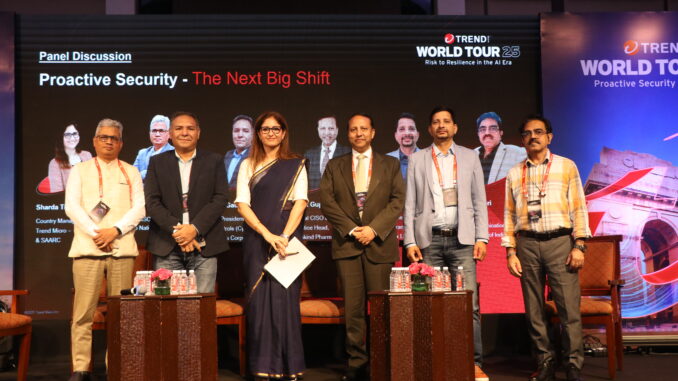 India, October 31, 2025: Trend Micro, a global leader in cybersecurity solutions, has successfully concluded the 3rd edition of its Risk to Resilience World Tour in India, with its closing event in Delhi. The nationwide tour spanned four major cities – Mumbai, Kolkata, Bengaluru, and Delhi, drawing over 500 attendees from leading enterprises and featuring more than 17 industry experts as speakers and panellists. Over 240 professionals participated in hands-on lab challenges, demonstrating strong enterprise commitment to building advanced cybersecurity capabilities.
India, October 31, 2025: Trend Micro, a global leader in cybersecurity solutions, has successfully concluded the 3rd edition of its Risk to Resilience World Tour in India, with its closing event in Delhi. The nationwide tour spanned four major cities – Mumbai, Kolkata, Bengaluru, and Delhi, drawing over 500 attendees from leading enterprises and featuring more than 17 industry experts as speakers and panellists. Over 240 professionals participated in hands-on lab challenges, demonstrating strong enterprise commitment to building advanced cybersecurity capabilities.
Centred on the theme “Proactive Security Starts Here”, the event highlighted the pressing need for enterprises to embrace forward-looking, AI-driven strategies to build true cyber resilience.
Delivering the keynote, Sharda Tickoo, Country Manager for India and SAARC at Trend Micro, drew attention to how adversaries are increasingly weaponizing artificial intelligence to accelerate attacks, shrinking exploit timelines from weeks to mere hours. She underscored that defensive AI is advancing even faster, enabling real-time detection, automated response, and proactive mitigation. Introducing Agentic AI as the next frontier, she explained how intelligent agents can collaborate to deliver unified and predictive defense. Central to this innovation is Trend Vision One, integrated with Trend Cybertron – the first cybersecurity LLM in the industry which delivers predictive analytics, offers risk scoring and automate remediation against advanced threats. While AI is reshaping the security landscape, Sharda emphasized that human oversight remains indispensable for ensuring governance and accountability.
A highlight of the event was an impactful panel discussion where security leaders from India’s largest enterprises shared real-world insights on building proactive security programs and the transformative power of unified platforms.
Ashwini Pandey, CISO, Punjab National Bank, highlighted how proactive security empowers SOCs to focus on the most business-critical risks. Vivek Shankar, CITSO & VP, Axis Max Life Insurance, emphasized that unified visibility and red-team simulations enable faster prioritization and resolution of threats. Vikas Gaur, VP – Audit, Risk & Controls, Moody’s, noted the intelligence gained to mitigate risks with greater precision, while Vivek Gupta, Global CISO, Mankind Pharma, stressed that simplified vulnerability management and mapped resolutions have accelerated smarter responses. Collectively, the panel reinforced that true cyber resilience lies in intelligence-led, predictive security built on unified, proactive platforms.
The Delhi/NCR region has emerged as one of India’s most dynamic hubs for cybersecurity adoption. Industries including BFSI, healthcare, pharma, manufacturing, IT, and telecom are accelerating their investments in cloud security, advanced threat detection platforms, zero trust architectures, and resilience frameworks. These enterprises recognize that robust cybersecurity is not merely a defensive necessity but a business enabler that protects revenue, maintains customer trust, and ensures operational continuity in an increasingly digital economy. Additionally, the government sector is actively fortifying national infrastructure, sensitive data, and citizen services against modern threats such as ransomware, supply chain compromises, and AI-driven attacks. These collective efforts position the region as a frontrunner in shaping India’s modern cyber defense landscape.
India continues to be a prime target for cyber adversaries, ranking 3rd globally and 2nd in Asia for malware detections, as highlighted in a recent Trend Micro report. Accounting for 4.74% of global activity with over 19.3 million threats detected, the country’s Banking, Financial Services, and Government sectors remain among the most heavily targeted. This surge in attacks reinforces the critical need for Indian enterprises and public institutions to strengthen resilience through proactive, intelligence-driven defences that can match the speed and sophistication of today’s threat landscape.

